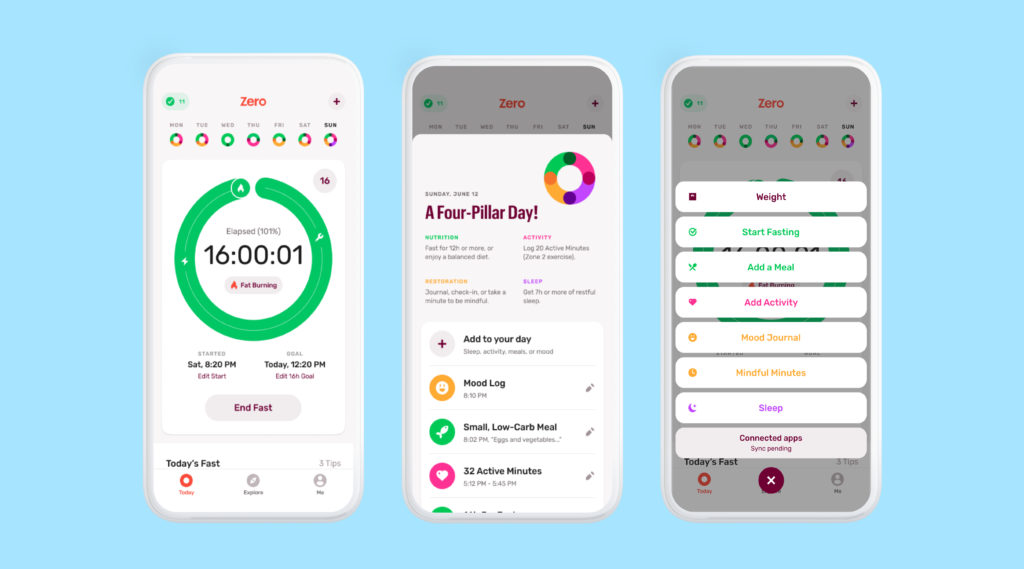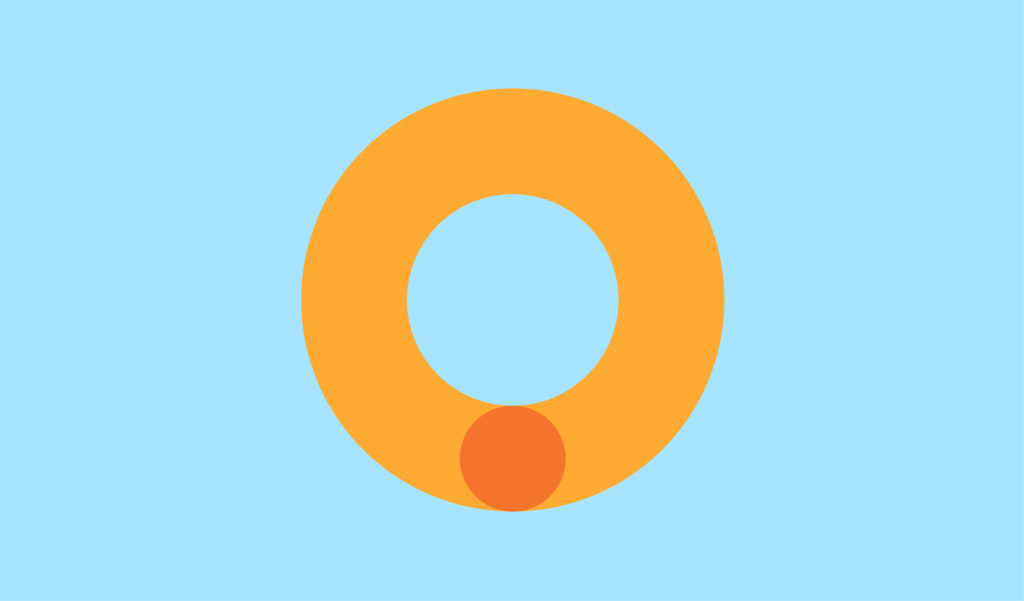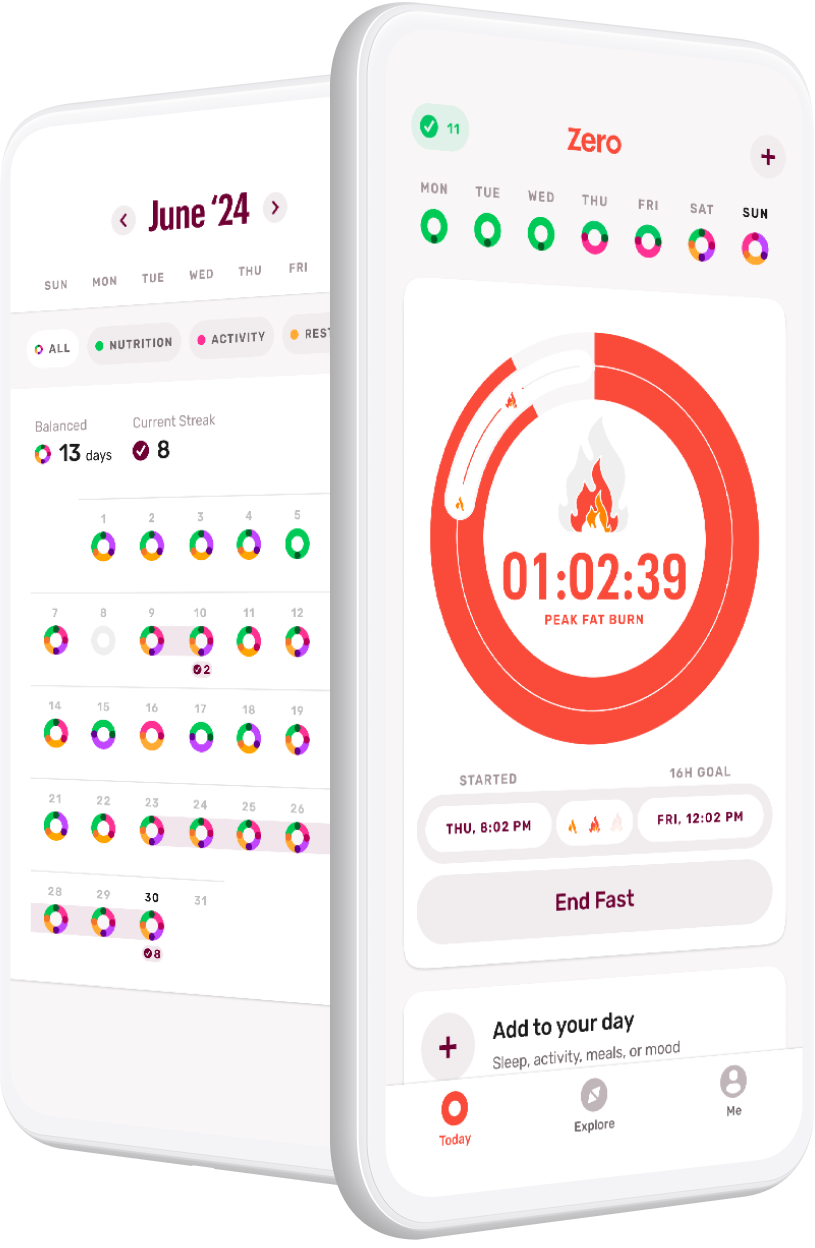Written and medically reviewed by Katya Meyers, RD
Ask your mom, doctor, or friendly registered dietician for nutrition advice, and you’ll almost certainly receive a lengthy and enthusiastic response. Since we’re all experts in our own self-designated n=1 nutrition study, nearly everyone has an opinion on what healthy eating is — and how to go about it.
While no one diet is right for everyone, we have enough data to support some basic nutritional tenets around what, when, and how we eat. Zero provides you with science-backed guidance so you can make informed decisions that suit your needs and lifestyle. Compounding Nutrition with the other Four Pillars of Health — Activity, Sleep, and Restoration — can help you optimize your health and accelerate your results.
Keep reading to discover the importance of the Nutrition Pillar, get practical tips for building healthy Nutrition habits, and see how Zero can guide you along the way.
How Nutrition Supports Your Health Goals
Healthy eating can help you lose and maintain weight, prevent chronic disease, enhance sleep, and even bolster your workouts. But to paint the complete picture of Nutrition, we have to look at the what, the when, and the how.
Regardless of your diet, a healthy and sustainable nutritional approach should always include minimally-processed whole foods like fruits, vegetables, fish, nuts, seeds, and legumes. By focusing on these foods, you’ll naturally avoid added sugars, refined carbs, and industrialized oils, such as canola and safflower oils.
After the what comes the when. Establishing a regular fasting practice can aid in weight loss, improve glucose tolerance, lower cholesterol, and boost metabolic flexibility.
Last but not least is how we eat. This is highly personalized, and it can (and should!) vary depending on your preferences, activity levels, hormones, and natural fluctuations in hunger. Mindful eating is one of the best ways to tune into your body’s natural hunger cues, curb cravings, reduce emotional eating, and bring intentionality to your meals.
How to Start Building Healthy Nutrition Habits
Reaching for an indulgent treat every once in a while (birthday cake, anyone?) is more than okay, but making healthy choices most of the time on most days should form the backdrop of your nutritional strategy. And to do that, you’ll need to have some solid habits in place.
Here are a few suggestions:
- Don’t forget protein. High-protein diets can increase satiety and promote weight loss. They also help build and maintain muscle, which is essential for metabolic health and basic functioning as we age (think avoiding falls and having the strength to carry groceries).
- Eat plenty of fiber. Fiber can protect against cardiovascular disease, infections, type 2 diabetes, and certain cancers. On top of that, it helps you feel fuller for longer.
- Cook at home whenever possible. Cooking at home gives you full control over what goes into your meals, and research shows it can even support physical as well as mental health.
- Keep healthy options on hand. Your diet is largely influenced by your food environment, which means a well-stocked fridge and pantry can do wonders for healthier eating.
- Create a dedicated space for mindful eating. Aim to have your meals somewhere that’s quiet, comfortable, and free from distractions. This allows you to savor each bite and check in with your hunger as you eat.
How Zero Helps You Eat Better
The best part about embarking on a Nutrition journey with Zero is that you’re not alone. In addition to a wealth of articles and videos, Zero has three important features that will help you assess your big-picture progress. Let’s get to know them!

The Loop
Visualize your journey and celebrate your wins across days, weeks, months, and years. As you log your healthy Nutrition habits, like fasting for at least 12 hours or enjoying a mindful meal, you’ll see the Loop fill up with Nutrition’s corresponding color, green. To fill in all four colors and close the Loop for the day, you’ll need to complete the other Pillars of Health — more on them later.
The Habit Tracker
Build actionable, data-driven Nutrition habits with the Habit Tracker. Simply tap on the “+” icon in the upper right corner of the Today tab, and watch your smart choices tell a compelling story of progress over time.
The Fasting Timer
Aside from being an integral part of the Nutrition Pillar, a consistent fasting practice can have significant, far-reaching benefits to several other areas of your health. With Zero’s Fasting Timer, you can track your fasts, receive custom Fasting Tips based on your unique metrics, and access Personalized Fasting Zones, which detail your body’s inner workings throughout a fast.
Pairing Nutrition with the Other Pillars of Health
When you integrate healthy Nutrition habits into your daily life, you’ll also move better, sleep better, and restore better. By linking these healthy habits, you’ll experience lasting, transformative changes to your well-being.
Nutrition + Healthy Activity

To track your healthy Activity habits, tap the “+” icon in the upper right corner of the Today tab. Using Apple Watch or another app or wearable? Connect Zero with Apple Health and we’ll automatically sync your daily progress.
Without proper nutrition, it’s impossible to truly capitalize on the hard-won effects of exercise. Protein intake in particular plays a crucial role not only for top athletes but also for every adult interested in living a long, healthy life. Sarcopenia, or muscle wasting, is one of the most nefarious conditions that poses a risk to our healthspan, as it affects our ability to carry out day-to-day activities and avoid falls as we age. The good news is that with sufficient protein intake and resistance exercise, we can maintain or dramatically slow the loss of muscle mass.
Tip: Support your workouts with protein-rich meals.
Nutrition + Healthy Sleep

To track your healthy Sleep habits, tap the “+” icon in the upper right corner of the Today tab. Using Apple Watch or another app or wearable? Connect Zero with Apple Health and we’ll automatically sync your daily progress.
When and what you eat impacts how you sleep. Research shows that beginning your fast a few hours before bedtime can improve sleep quality, reducing the number of nighttime wake-ups and increasing the amount of time spent in deep sleep. Therefore, to improve the quality of your sleep, start your fasting window 2–4 hours before your desired bedtime.
What you eat also matters. Studies find that people who eat higher-quality carbohydrates (complex carbs like oatmeal vs. simple sugars like gummy bears) tend to fall asleep faster and have a lower risk of insomnia. Moreover, a protein-rich diet, where protein comprises at least 20–30% of your caloric intake, can promote uninterrupted sleep.
Tip: Slot your last meal of the day to be 2–4 hours before bedtime, and make sure it’s rich in complex carbs and protein.
Nutrition + Healthy Restoration

To track your healthy Restoration habits, tap the “+” icon in the upper right corner of the Today tab.
Healthy restoration encompasses self-care and stress-management activities such as yoga, foam rolling, meditation, ice baths, and massages. These activities can also influence what and how you eat. Mindfulness activities in particular — including journaling and yoga — have been associated with consuming more fruits and vegetables and less fast food.
Likewise, studies show that eating fewer highly-processed foods can enhance your mood and decrease the risk of depression. When combined together, healthy Nutrition and Restoration can work in tandem to heighten your quality of life.
Tip: Boost your energy levels by prioritizing fresh, satiating foods.
Conclusion
Nutrition is the cornerstone of metabolic well-being, and contrary to popular belief, it comprises not just what you eat, but also when and how. Furthermore, it’s deeply intertwined with the other Pillars of Health, and building symbiotic habits across Activity, Sleep, and Restoration will put you on the right path towards living better, longer.
- The Fasting Guide to Menopause, Perimenopause, and Postmenopause - April 8, 2024
- Try This Instead of That: How to Bookend Your Fasts - March 25, 2024
- 60 Names for Sugar: The Myths, The Facts, and What You Should Know - February 12, 2024

